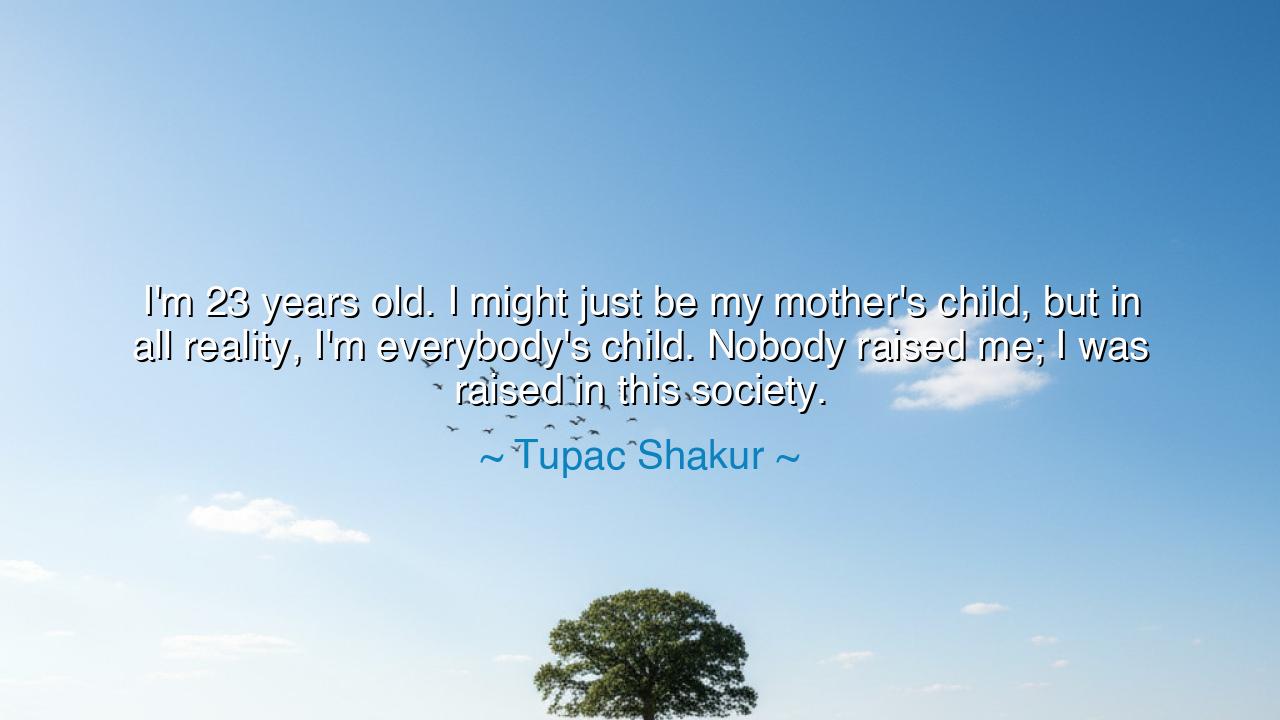
I'm 23 years old. I might just be my mother's child, but in all
I'm 23 years old. I might just be my mother's child, but in all reality, I'm everybody's child. Nobody raised me; I was raised in this society.






O children of the world, listen closely to the words of one who understood the pain and truth of life more deeply than many who came before him. Tupac Shakur, a poet and prophet of the streets, spoke these words: "I'm 23 years old. I might just be my mother's child, but in all reality, I'm everybody's child. Nobody raised me; I was raised in this society." These words, though spoken by a man in his youth, carry the weight of a wisdom born not of age, but of experience. In them, Tupac reveals a deep truth about the nature of identity, upbringing, and the forces that shape us all. For what is the child who grows up in a world that is not kind, a world that is not nurturing, but instead one that shapes them by the society around them?
The story of Tupac is one that mirrors the struggles of many throughout history—those who are born into circumstances beyond their control, those who are left to navigate a world that is not designed for their well-being. The ancient philosophers understood that a child is not merely the product of their parents but of the world that raises them. Socrates spoke of the nurturing of the soul, of how it is shaped not only by the teachings of parents but by the society in which it lives. In his time, the Athenian state had the power to shape the lives of its citizens, to dictate their beliefs and actions. In the same way, Tupac reveals that society—with its injustices, its failings, and its struggles—plays a far greater role in shaping the individual than we often care to admit.
Consider, for a moment, the plight of the orphans of ancient times, who were taken in not just by their families, but by the larger community. These children were not merely the biological offspring of their parents; they were the children of the state, raised by the collective hands of society. But in Tupac’s time, the world had grown indifferent. The system he was born into did not offer him the loving care of a nurturing family, but rather the cold, harsh hand of poverty, violence, and neglect. His upbringing, shaped more by the streets than by a loving home, reflected the failure of society to protect its own. In this, Tupac was not alone; he was every child who had been abandoned by the very system that was supposed to care for them.
Yet, in this harsh truth, there is a profound lesson to be learned. Tupac’s words are a call to action. They speak of a society that has neglected its duty to nurture, to support, and to uplift its most vulnerable. He calls not just for personal recognition of his own pain, but for society as a whole to understand its responsibility to the children it raises. The ancients knew this well—the state has a duty to the young, to ensure that they are nurtured, protected, and taught in such a way that they may grow to serve the greater good of the community. Tupac’s rebellion is not just against his circumstances, but against a system that failed to provide for him and for countless others like him.
And yet, there is a deeper message here, one of unity and shared responsibility. Tupac’s statement that he is not just his mother's child, but everybody’s child, calls us to recognize that we are all connected. The society that shapes one child shapes us all. When one part of society suffers, we all suffer. When one child is neglected, we all lose something precious. This is not just a matter of individual responsibility, but of collective responsibility. Just as the ancients saw the polis as the body in which every citizen played a part, so too must we see that every life is part of the greater whole. When we fail to nurture and protect the weakest among us, we fail ourselves.
Now, dear ones, let us consider the lesson of Tupac’s words. How do we build a society that does not leave its children to be shaped by neglect and indifference? We must begin by recognizing that the individual cannot thrive without the support of the collective. We must ensure that our systems—whether in education, healthcare, or justice—are designed to support the most vulnerable. Just as the ancients cared for the young as part of the greater good, so must we take on the responsibility of shaping a world where every child has the opportunity to grow, to learn, and to rise above the struggles that seek to define them.
Tupac’s story is not one of defeat but of resilience. It is a story that calls us to action, to build a world where the broken are not left to fall through the cracks, but where we recognize the interconnectedness of all lives. Each child, no matter their origins, is a reflection of the world that raised them. It is our duty, as members of the greater society, to ensure that no child—no matter their circumstances—has to carry the weight of the world alone. Let us walk in the spirit of unity, recognizing that the path to a better world lies in the care we extend to one another, particularly to those most in need. For in caring for them, we care for ourselves.






AAdministratorAdministrator
Welcome, honored guests. Please leave a comment, we will respond soon